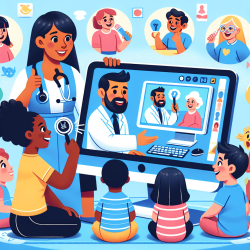The landscape of health professions education is rapidly evolving, and as practitioners in online therapy, it's crucial to stay ahead of the curve. The recent research article "The future of health professions education: Emerging trends in the United States" by George E. Thibault provides valuable insights that can help you enhance your skills and adapt to the emerging trends in this field.
Key Trends in Health Professions Education
According to Thibault (2020), several key trends are shaping the future of health professions education. Here are some that are particularly relevant for online therapy practitioners:
- Interprofessional Education (IPE): IPE is gaining momentum as it promotes collaborative practice among different health professions. This approach can be integrated into online therapy platforms to improve the quality of care provided to students.
- Competency-Based Education: Moving away from time-based education to competency-based education allows practitioners to focus on mastering specific skills. Online therapy programs can incorporate this model to ensure therapists are well-equipped to meet the diverse needs of students.
- Technology Integration: The use of advanced technologies, such as AI and telehealth platforms, is becoming increasingly important. Embracing these technologies can enhance the delivery of online therapy services and improve outcomes for students.
- Focus on Mental Health: There is a growing recognition of the importance of mental health in overall well-being. Online therapy practitioners should prioritize mental health support and integrate it into their practice.
Implementing These Trends in Online Therapy
To improve your skills and stay relevant in the evolving landscape of health professions education, consider implementing the following strategies:
1. Embrace Interprofessional Collaboration
Collaboration with other health professionals can lead to better outcomes for students. Engage in regular interdisciplinary meetings and training sessions to foster a collaborative environment.
2. Adopt Competency-Based Training
Shift your focus from the number of hours spent in training to the competencies acquired. Use online platforms that offer competency-based modules and assessments to track your progress.
3. Leverage Technology
Stay updated with the latest technological advancements in telehealth and online therapy. Utilize AI-driven tools for personalized therapy sessions and data analytics to monitor student progress.
4. Prioritize Mental Health
Integrate mental health support into your online therapy practice. Offer resources and tools that address the mental health needs of students, and consider additional training in mental health counseling.
Encouraging Further Research
The trends highlighted in Thibault's research underscore the importance of continuous learning and adaptation. As an online therapy practitioner, staying informed about the latest research and developments in health professions education is crucial. Consider subscribing to relevant journals, attending conferences, and participating in professional networks to stay updated.
Conclusion
The future of health professions education is dynamic and full of opportunities for growth. By embracing interprofessional collaboration, adopting competency-based training, leveraging technology, and prioritizing mental health, you can enhance your skills and provide better care to students.To read the original research paper, please follow this link:
The future of health professions education: Emerging trends in the United States.










